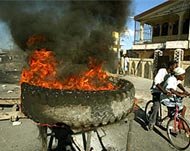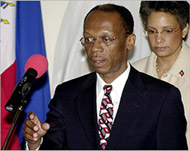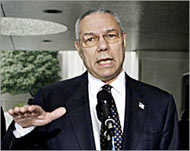Haiti premier warns of coup d’etat
Haiti’s premier has warned of an impending coup amid fears that an uprising may have reached Haiti’s second city, Cap-Haitien.

Prime Minister Yvon Neptune appealed for international aid, but the United States and France have expressed their reluctance to send troops to put down the rebellion that has killed at least 57 people.
Police and armed supporters of President Jean-Bertrand Aristide mounted barricades and patrolled the streets of Cap-Haitien on Haiti’s north coast on Tuesday. Flights to that city – already cut off by land – were cancelled.
“We are witnessing the coup d’etat machine in motion,” Neptune said, urging the international community “to show it really wants peace and stability.”
Aid agencies called for urgent international action, saying Haiti is on “the verge of a generalised civil war.” The UN refugee agency met with officials in Washington to discuss how to confront a feared exodus of Haitians, though there are no immediate signs of people fleeing.
|
“We are witnessing the coup d’etat machine in motion …(the international community) needs to show it really wants peace and stability” Yvon Neptune, |
In Gonaives, rebels fired shots into the air to prevent crowds of hungry residents from stampeding several trucks loaded with food – lentils and millet – brought by the aid agency CARE. Exclusive film from Associated Television news showed one woman trampled in the melee. She was taken to a hospital for treatment.
The food was the first shipment to reach Gonaives, Haiti’s fourth largest city, since it was taken by rebels who began the revolt 5 February.
Brutality
The brutality of the insurrection was on display in the central city of Hinche, where the bullet-riddled body of a policeman lay, unburied and rotting, outside the local police station.
 |
|
Barricades have been mounted in |
Hinche, at a strategic crossroads in Haiti’s agriculture-rich Artibonite district, was seized Monday by some 50 rebels reportedly led by former death squad leader Louis-Jodel Chamblain. It is only 115km northeast of Port-au-Prince but can take more than three hours to reach on potholed roads depreciated to bedrock.
“If the bodyguards of the police chief hadn’t fought back he wouldn’t have been killed,” resident Francoise Joseph told APTN, saying other police were allowed to leave.
About 30 heavily armed police officers barricaded themselves into the nearby town of Mirebalais and nervously scanned the horizon for potential attackers.
Flights cancelled
Also on Tuesday, airlines in Port-au-Prince cancelled flights to the Cap-Haitien, a city of a half-million people, after witnesses in the barricaded city saw a boat approach and rumours swept the town that rebels were about to attack.
 |
|
Aristide has lost support since |
Aristide was wildly popular when he became Haiti’s first freely elected leader in 1990. But he has lost support since his party swept flawed legislative elections in 2000 and is accused of using police and armed militants to stifle dissent.
In Hinche, some residents fled and others staged a spontaneous demonstration in favour of rebels who returned to the town throughout the day, but were camped outside.
‘Political solution’
Haiti’s 5000-member police force appears unable to stem the revolt, Neptune conceded on Tuesday, asking for technical help to strengthen the force. Both he and Aristide have stopped short of asking for military intervention.
 |
|
Powell said ‘there is frankly no |
US Secretary of State Colin Powell said Tuesday “there is frankly no enthusiasm right now for sending in military or police forces to put down the violence.”
Powell said the international community wants to see “a political solution” and only then would willing nations offer a police presence to implement such an agreement.
Powell spoke by telephone with French Foreign Minister Dominique de Villepin, who called an emergency meeting in Paris to weigh the risks of sending peacekeepers and discuss how otherwise to help Haiti, an impoverished former colony that is home to 2,000 French citizens.
“Can we deploy a peacekeeping force?” de Villepin asked on France-Inter radio, noting it “is very difficult” amid violence.
He said France had 4000 troops in its Caribbean territories of Martinique and Guadeloupe trained in humanitarian work.
Humanitarian aid
But he also told French TV that “an intervention force … implies a stop to the violence, a restart to dialogue. Nothing will be possible in Haiti if there isn’t a jolt.”
|
“An intervention force … implies a stop to the violence, a restart to dialogue. Nothing will be possible in Haiti if there isn’t a jolt” Dominique de Villepin, |
UN Secretary-General Kofi Annan said on Tuesday the world body plans to “become much more actively engaged” in Haiti’s crisis.
Meanwhile, Canada offered nearly US$1 million in medical and food aid, and the United States said it was ready to give US$500,000 in humanitarian assistance through the United Nations.
The rebels now control roads leading to the Artibonite district, Haiti’s breadbasket and home to 1 million people, and have cut supplies of food and fuel to northern Haiti.